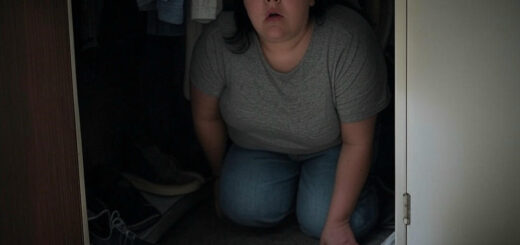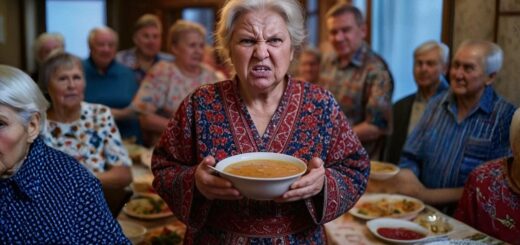Your cancer can wait — Mom’s got a big birthday bash to celebrate…
The last message was from James: “Running late, meeting. Love you, kisses.” Short, almost formal. Lately, he’d grown distant, staying late at work, looking tired and distracted during hospital visits. Emily attributed it to stress: juggling work, the hospital, and home, plus constant pressure from Margaret, who surely never missed a chance to voice her opinions. “It’ll get better soon,” Emily promised herself. “We’ll get through this and come out stronger.”
James sat in his car, parked outside his mother’s house, staring at his phone. A message from Emily: “Okay, love. I’ll wait for you tonight.” He turned off the phone and took a deep breath. There was no meeting. He’d lied to buy time. Time for… what? For a conversation with his mother he’d been avoiding for days.
Margaret lived in an old house in the city center, inherited from her parents. The large, unwelcoming apartment had high ceilings and heavy antique furniture. James grew up here, among these bulky cabinets and dusty curtains, under his mother’s constant control. After his father left, she poured all her energy into her only son. He remembered her checking his homework, choosing his friends, making him wear clothes she deemed proper. As a child, it felt like care; as a teen, it sparked rebellion; by his 20s, it became a habit—letting his mother run his life.
Even marrying Emily against Margaret’s wishes wasn’t true independence, just a fleeting lapse in judgment, as he sometimes thought. Emily was beautiful, smart, caring—the opposite of his domineering mother. With her, he felt strong, confident, a real man, not a mama’s boy. Their marriage was happy for the first three years. Then came the clashes with Margaret, who never missed a chance to remind him: “That wife of yours can’t cook a decent meal, doesn’t iron your shirts right, isn’t respectful enough to her mother-in-law.” James was caught in the middle: Emily begging him to shield her from Margaret’s attacks, and his mother accusing him of betrayal. Then Emily’s cancer hit, and everything got harder.
James finally gathered his courage, got out of the car, and climbed to the third floor. The door swung open as soon as he rang the bell: Margaret, as if expecting him, stood waiting. “Jimmy!” she threw her arms open. “Come in, I made your favorite apple pies.” The apartment smelled of baking and vanilla, a scent tied to his childhood. His mother often baked to please him. But that sweet aroma, like much else, had a double edge: care laced with control.
“Mom, we need to talk,” James said, walking into the kitchen. “Of course, honey,” she fussed, pulling out cups. “Tea? Coffee?” “Nothing,” he sat at the table, collecting his thoughts. “It’s about your birthday.” Margaret’s face lit up. “Oh, my 60th! That’s a big one, you know! I’ve got a guest list already, about a hundred people. We’ll need a nice restaurant, maybe with a river view. The Riverside or The Pier, what do you think?”
James closed his eyes, feeling a vein throb in his temple. “Mom, listen. We can’t afford a big party right now. All our savings are going to Emily’s treatment, you know that. Maybe we can do something small, at home? Or wait for better times?” Margaret’s smile faded. Her eyes turned cold and sharp. “Wait?” she repeated. “You’re suggesting I postpone my 60th birthday, a once-in-a-lifetime event, because of… her?” She never used Emily’s name in talks with James. Always “her,” “your wife,” or, at best, “that girl.” As if refusing to acknowledge her as a person.
“Not because of her, Mom,” James said wearily. “Because of the situation. Emily has cancer, she needs surgery. It’s life or death.” “And my life doesn’t matter?” Margaret’s voice trembled. “I raised you, sacrificed everything for you. And now, when I want a little attention, a little celebration before I’m old, you tell me to wait?” She pressed a hand to her chest dramatically, and James winced. He’d seen these theatrics his whole life—every time she didn’t get her way.
“I’m not saying no party,” he tried to soften it. “Just not now, not like—” “Not like what? Like honoring your mother?” she cut in. “Be honest, James, is she turning you against me? Did she say you can’t spend money on your old mom’s birthday?” “Emily doesn’t even know I’m here,” James rubbed his temples. “This is my decision, Mom.”
“Your decision?” Margaret gave a bitter laugh. “Since when do you make your own decisions? You’ve always been my boy, doing what I say. Then she came along, and everything changed. Even got sick on purpose to tie you to her tighter.” “Mom!” James raised his voice. “No one chooses to get cancer. It’s unfair to blame Emily.” “Unfair?” Margaret stood, hands on hips. “You know what’s unfair? That my only son picks some accountant over his own mother. That I’ll spend my 60th alone while you’re at her bedside!”
Her face twisted, and she clutched her chest, sinking heavily onto the chair. “Mom!” James jumped up, panic in his eyes as her face paled. “What’s wrong? Your heart? Where’s your medicine?” “In my purse,” she whispered, pointing a trembling hand at the bag on the chair. James rushed over, digging through it until he found a small box of nitroglycerin. He shook out a tablet into her palm. “Under your tongue, quick!” Margaret obeyed, closing her eyes. For a few minutes, they sat in silence: her breathing steadying, him holding her hand, cold sweat trickling down his back.
“Better?” he asked when her breathing evened out. “A little,” she nodded weakly. “See what you’ve done to me? Want your mother to die early?” James felt a stab of guilt. Maybe he’d been too harsh. She wasn’t young, had heart issues. Maybe this birthday really meant that much to her.
“Mom, I didn’t mean to upset you,” he patted her shoulder. “It’s just a tough time.” “It’s always a tough time, Jimmy,” Margaret gave a faint smile. “But family comes first. I’m your family, honey. I’ll always be here, no matter what. And her?” She paused. “She might not make it, you know that. Then what? You’ll be alone, unwanted.”
James wanted to argue, to say Emily would recover, that they’d have years together. But the words stuck in his throat. Deep down, a fear lingered: what if his mother was right? What if all the money, effort, and stress were for nothing? What if he was a widower at 30? “I’m not saying abandon her, God forbid!” Margaret continued, as if reading his mind. “But my life matters too, honey. My birthday. The one time I’m asking for something for myself.”
She clutched her chest again, and James leaned forward, alarmed. “Okay, okay, Mom, don’t worry,” he said quickly. “You’ll have your party. I’ll figure something out.” Margaret’s face brightened. “Really?” she looked at him with almost childlike hope. “You’ll give me the celebration I dreamed of?” James nodded, not fully grasping what he was agreeing to, but desperate to avoid seeing her like that again. “Yes, Mom. I promise.”..
























